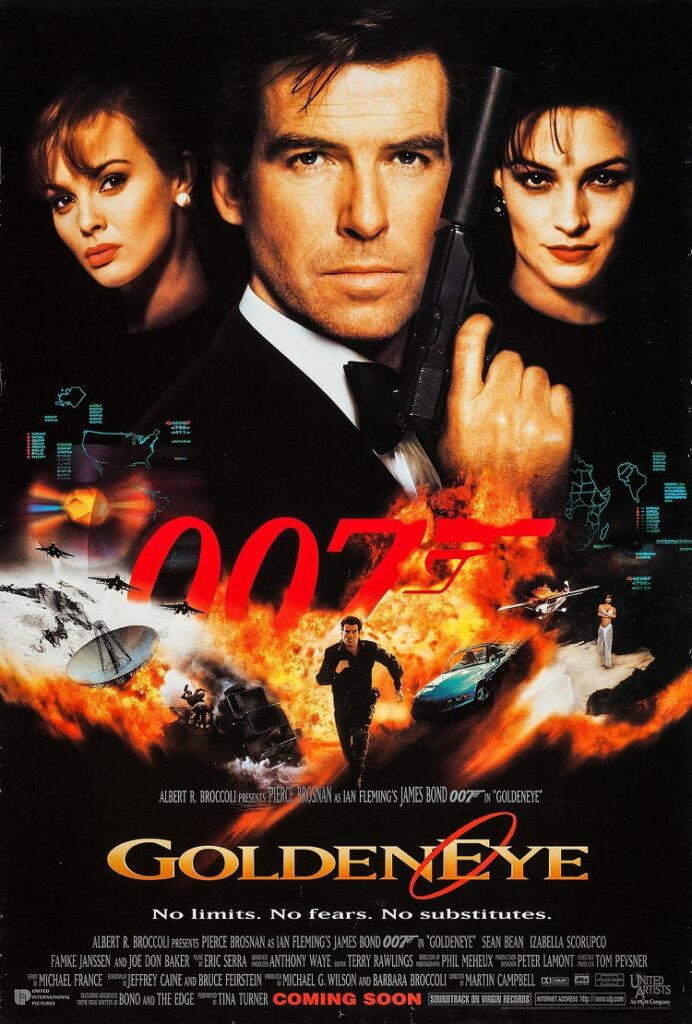
Written by Ben Platko
I am far too young to remember most Bond movies opening, and GoldenEye is no exception. Released in 1995, GoldenEye marked Pierce Brosnan’s first Bond film, and the last appearance of the Walther PPK as Bond’s trusted sidearm. It was the first 007 movie produced after the dissolution of the Soviet Union, and end of the Cold War, which provided a wonderful backdrop for the plot.
In true 007 fashion, GoldenEye opens with our hero rappelling down a dam in Soviet Russia (1986) to destroy an illicit chemical weapons factory. Things go bad when Bond’s partner – 006 – is executed in front of him. Bond escapes on a plane, and we jump nine years ahead to the present. A Russian general blows up a satellite facility in Severnaya with the help of the GoldenEye – a satellite weapon project which was a relic of the Cold War. On his way out of the facility, the general and his femme fatale sidekick, Xenia Onatopp (Famke Janssen), kill all the scientists, and steal the GoldenEye key. It’s up to the world’s greatest secret agent to retrieve the key, and keep it from falling into the hands of the Janus crime syndicate – who wish to use the weapon against London.
GoldenEye was host to many historic firsts and lasts for the franchise. As well as being Brosnan’s first Bond film, it was the last that Albert Broccoli saw (he died seven months after the film’s release). It also marked Judi Dench’s first appearance as M, BMW’s first appearance, the first time Bond wore an Omega watch, and it was the first film in the franchise not to take story elements from Ian Fleming’s novels. The greatest accomplishment of GoldenEye is a touch bittersweet: it was the last Bond movie to really feel like a Bond movie. The rest of Brosnan’s tenure was far too shiny and glitzy, and Craig’s Bond is gritty and real. GoldenEye has the masterful blend of suavity, action, and wit that we came to expect from Connery and Moore.
The only gripe I have, if any, is that the director – Martin Campbell – was too conservative. The action, the shots, the editing, the pacing, the cinematography, were all straight out of a textbook. Honestly though, Bond films tend to benefit from basic filmmaking concepts. This was Campbell’s first tango with MI6, but it was not his last. He also directed the least conservative Bond film: Casino Royale. That’s right; the same man was at the helm of two of the most iconic (and, in this humble writer’s opinion, two of the best) 007 movies in the catalogue.
I might be just a little nostalgic and biased, but I would be doing the film a disservice if I didn’t mention the video game at all. I spent countless hours playing GoldenEye on my Nintendo 64. Playing it today, the game looks a little dated, and the controls are all sorts of weird, but the gameplay is still incredible, and just as much fun to play as it was fifteen years ago. Nostalgia aside, though, GoldenEye is perhaps one of the most important games ever released – it spawned the age of first-person shooters on game consoles: without it, console gaming would look very different today.
If you have not seen GoldenEye yet, you need to. Tons of great action, over-acted Russian accents, and a certain British charm add up to make a wonderful viewing experience. Also, James Bond drives a tank through St. Petersburg. That should be reason enough to watch GoldenEye over and over.
Operation: BOND will return with Tomorrow Never Dies.